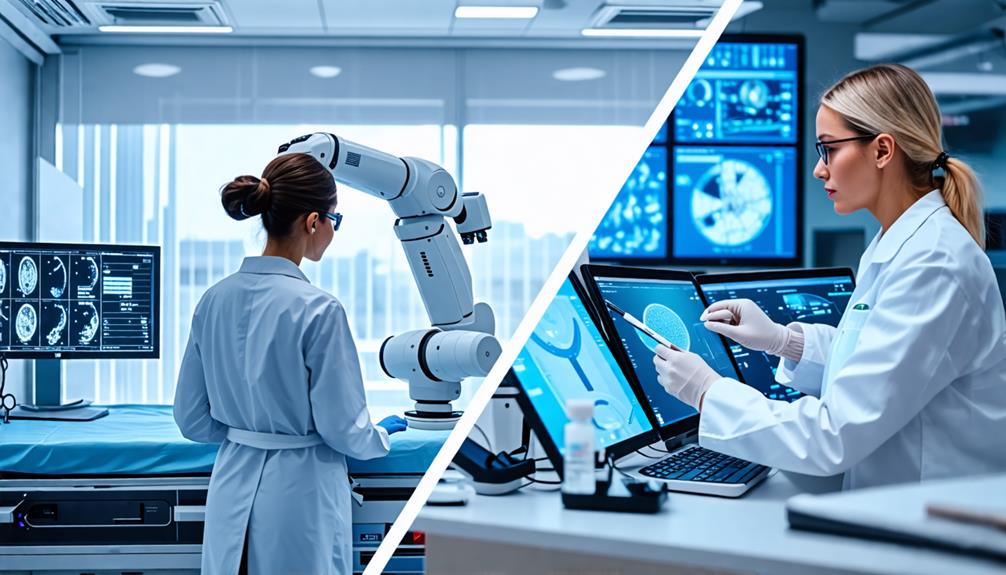
Healthcare tech and medtech differ significantly, though both are crucial to modern medicine. You'll find healthcare tech focuses on enhancing care and streamlining processes, including tools like electronic health records and telehealth services. These technologies help improve access and support preventive care with wearable tech and apps. In contrast, medtech specifically centers on medical devices and diagnostic tools such as MRI machines, improving diagnosis, prevention, monitoring, and treatment. It's more product-oriented, whereas healthcare tech broadly addresses services and operational efficiencies. Exploring these distinctions further could offer valuable insights into their unique impacts on your health management.
Defining Healthcare Technology
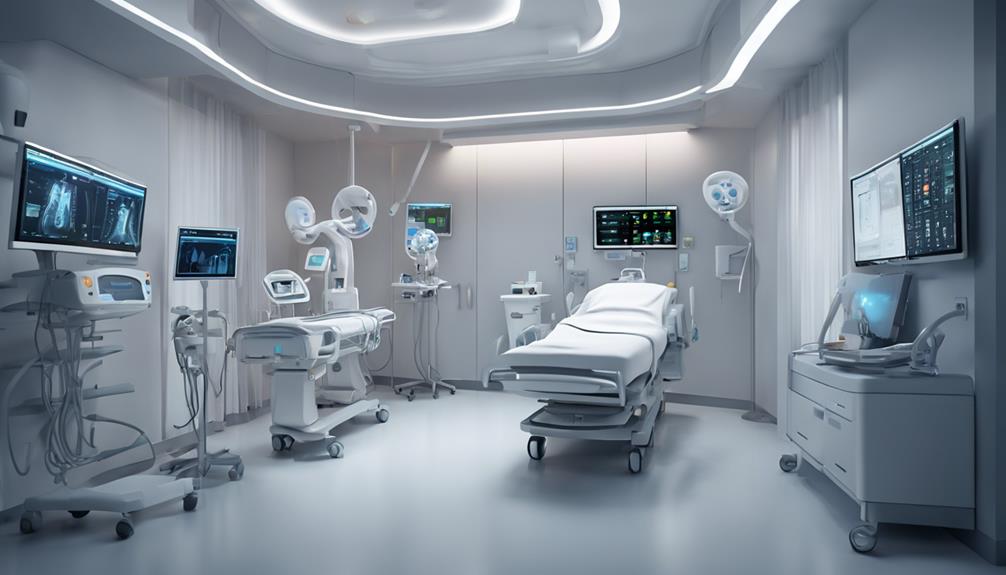
Healthcare technology, often called healthtech, enhances patient care and streamlines medical processes by integrating advanced tech solutions. As you navigate the healthcare landscape, you'll find that healthtech plays a pivotal role in improving your access to healthcare services. It encompasses a broad range of applications, from electronic health records (EHRs) that facilitate quick access to your medical history, to telehealth services that allow you to consult with doctors remotely.
Imagine you're managing a chronic condition like diabetes; healthtech tools can help you monitor your blood sugar levels and share that data directly with your doctor in real-time. This integration of technology not only supports better health outcomes for you but also optimizes the workload of healthcare providers by automating routine tasks.
Furthermore, healthtech is instrumental in advancing preventive care. With wearable tech that tracks your physical activity and nutritional apps that guide your diet, you're empowered to take charge of your health proactively. This not only helps prevent the onset of diseases but also reduces the overall healthcare costs.
Understanding Medtech
While healthtech focuses on enhancing patient care through technology, medtech specifically targets the development of medical devices and diagnostic tools. You'll find that medtech plays a crucial role in improving the diagnosis, prevention, monitoring, and treatment of diseases and medical conditions. It's all about innovation in the field of medical sciences, aiming to enhance the quality of life and extending the effectiveness of health solutions.
The scope of medtech is broad, encompassing everything from simple bandages and braces to complex MRI machines and robotic surgical devices. It's not just about creating new products; it's also about refining existing technologies to make them safer, more effective, and more accessible to you and others who need them.
For example, think about the pacemaker, a medtech device that's been revolutionary for patients with heart conditions. It's a small device implanted in the chest to help manage irregular heartbeats. Over the years, advancements in medtech have allowed these devices to become more sophisticated, incorporating features like remote monitoring, which allows doctors to check on your heart without you needing to step into a clinic.
Understanding medtech means recognizing its critical role in pushing the boundaries of what's medically possible, thereby transforming healthcare delivery and patient outcomes.
Key Applications of Healthcare Tech
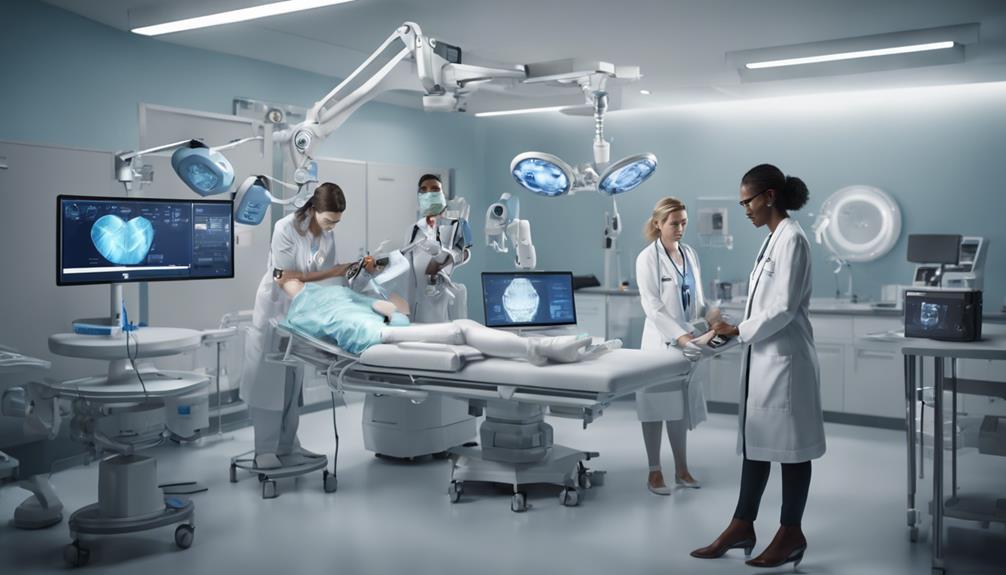
In exploring the realm of healthcare tech, you'll discover its critical applications in areas like telemedicine, electronic health records, and wearable health devices. These innovations aren't just gadgets; they're transforming how you receive care.
Let's start with telemedicine. It allows you to consult with doctors via video calls, reducing the need for physical visits. This is especially vital in remote or underserved areas where medical facilities might be sparse. You can get diagnoses, prescriptions, and follow-up care, all from your home.
Next, consider electronic health records (EHRs). These digital records streamline the way your medical history is stored and shared. No more bulky files or lost documents; everything from your allergies to your medical history is at your healthcare provider's fingertips. This not only speeds up the care process but also enhances the accuracy of the treatments you receive.
Lastly, wearable health devices monitor your vital signs like heart rate and blood pressure in real-time. They offer you and your healthcare providers timely insights into your health status, potentially alerting you to issues before they become severe. This proactive approach can lead to better health outcomes and personalized care strategies.
Core Components of Medtech
Now let's explore the core components of medtech, which include medical devices, software algorithms, and regulatory frameworks.
You'll find that medical devices range from simple bandages to complex MRI machines. They're designed to diagnose, monitor, or treat medical conditions. The effectiveness of these devices depends heavily on their design and usability.
Software algorithms, on the other hand, are the brains behind the operation. They interpret data from devices, predict outcomes, and even assist in clinical decision-making. It's crucial that these algorithms are accurate and reliable, as they often inform critical medical decisions.
Lastly, regulatory frameworks govern how these devices and software are developed, tested, and brought to market. In the U.S., the Food and Drug Administration (FDA) sets strict guidelines to ensure that medtech products are both safe and effective before they can be used in a clinical setting. This regulatory environment is constantly evolving to keep pace with technological advances, ensuring that new innovations meet stringent safety standards.
Understanding these components helps you appreciate how intricate and interconnected medtech really is. Each part plays a crucial role in the overall effectiveness and safety of medical technology.
Impact on Patient Care
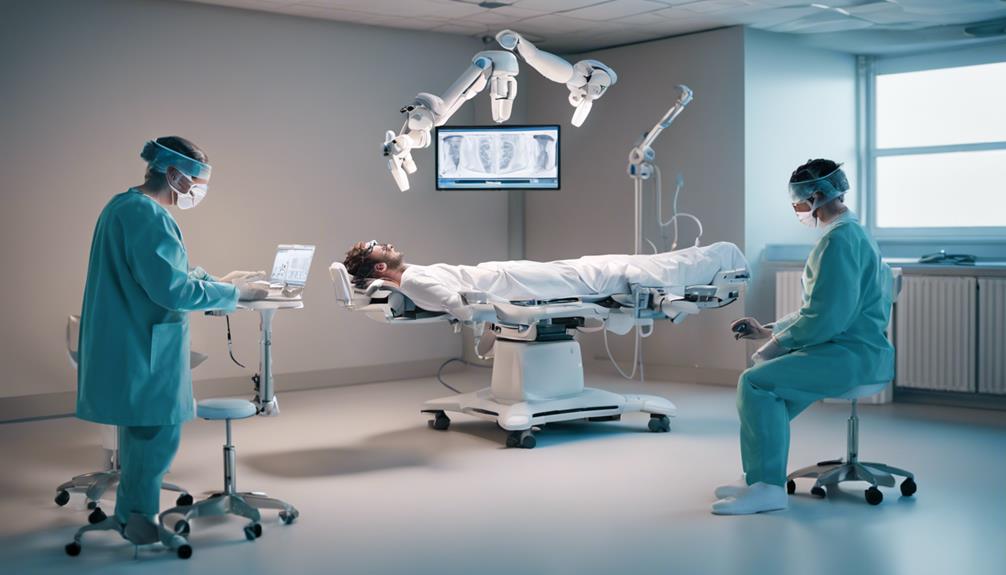
Medtech significantly enhances patient care by improving diagnostic accuracy and treatment efficacy. When you walk into a medical facility today, you're entering an environment where advanced devices and software streamline complex procedures and monitor your health with incredible precision. This isn't just about quicker services; it's about targeted treatments that specifically address your unique health issues, reducing the one-size-fits-all approach that used to pervade medicine.
You'll notice that your interactions with healthcare professionals are changing too. They've got access to real-time data and tools that allow for better decision-making. That means you're likely to experience fewer diagnostic errors and receive more effective care tailored to your specific needs. It's not just about being treated; it's about being treated right.
Moreover, this enhanced care doesn't only apply while you're in the hospital or clinic. Medtech extends its benefits to remote monitoring tools that keep you connected with your healthcare team even from home. This continuous oversight ensures that any potential issues are caught early, which can be crucial in managing chronic conditions or following up after procedures. So, you're not just receiving intermittent care; you're under continuous, vigilant care that adapts to your life's pace.
Technological Innovations in Healthcare
Technological innovations are transforming how you receive healthcare, making treatments more precise and recovery times faster. You're seeing a revolution, not just in the tools at your doctors' disposal but in the very approach to diagnosing and managing health conditions.
Imagine walking into a clinic where your medical history is instantly accessible through a digital health record that integrates real-time data from wearable devices monitoring your vital signs. This isn't just convenient; it enhances diagnostic accuracy and personalizes your treatment plans.
Telemedicine is another game changer. You can now consult with top specialists without the need to travel, reducing your stress and saving time. These virtual visits aren't only about convenience but also about expanding access to quality care, particularly in underserved areas.
Moreover, AI-driven technologies are analyzing complex medical data at unprecedented speeds, offering insights that were previously unattainable. This isn't about replacing human doctors but empowering them with tools that can predict, diagnose, and treat with a level of precision that was unimaginable just a few years ago.
You're at the center of a healthcare transformation that's not just improving the quality of care but also making it more accessible and tailored to your individual needs.
Future Trends in Medtech
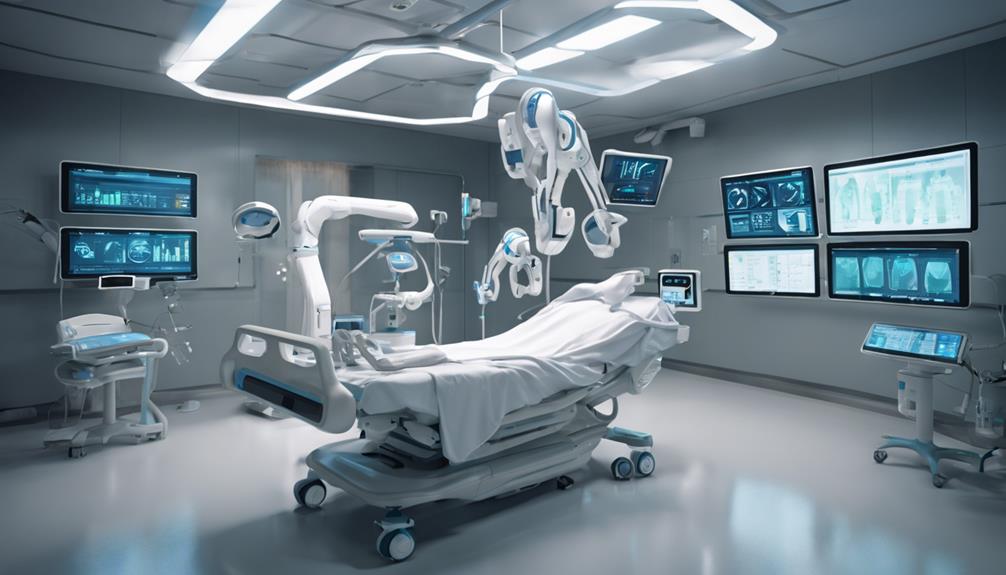
Several emerging trends in medtech are set to revolutionize your experience with healthcare in the coming years. You'll soon see a surge in personalized medicine, where treatments and medications are tailored specifically to your genetic makeup. This means doctors can pinpoint the most effective therapies for you with greater accuracy, minimizing trial and error.
Additionally, you'll witness a remarkable integration of artificial intelligence (AI) in diagnostic processes. AI's ability to analyze large datasets rapidly means it can identify patterns that might elude human experts. This isn't just about quicker diagnoses; it's about more precise ones, potentially catching diseases before they become serious.
Wearable technology will also take a leap forward. Imagine having a smartwatch that not only tracks your fitness but also predicts potential health issues based on real-time data. This could alert you and your doctor to early signs of conditions like heart disease or diabetes, prompting preventative measures much earlier.
Lastly, the advent of robotics in surgery is reshaping operating rooms. Robots are becoming more sophisticated, allowing for procedures that are less invasive and with quicker recovery times. You'll benefit from shorter hospital stays and reduced risk of complications, making your healthcare experience safer and more efficient.
Regulatory Challenges and Solutions
As you navigate the evolving world of medtech, understanding the regulatory hurdles and their solutions becomes crucial. Different countries have their own sets of rules, which can complicate launching new products.
You'll find that in the U.S., the Food and Drug Administration (FDA) sets stringent requirements for medtech approvals. This means you've got to be meticulous in clinical testing and data reporting.
In the European Union, the Medical Device Regulation (MDR) poses its own challenges. They're strict about device traceability and safety, necessitating thorough documentation and frequent audits. You might feel overwhelmed, but there's good news. Regulators are increasingly open to dialogue and collaboration. Leveraging this can ease your navigation through approval processes.
Moreover, employing a regulatory expert can be a game-changer. These professionals understand the nuances of regulations and can streamline your strategy for compliance. They'll help you identify critical steps, manage submissions, and even train your team on regulatory matters.
Frequently Asked Questions
How Do Privacy Concerns Differ Between Healthcare Tech and Medtech?
In healthcare tech, you're looking at broader data privacy concerns due to varied applications, while medtech focuses more on device-specific issues like patient data security from medical devices and associated software.
What Are Typical Career Paths in Healthcare Tech Versus Medtech?
In healthcare tech, you might focus on software development or data analysis, while in medtech, you're likely to work on device innovation or clinical trials. Both offer paths in management or consulting.
How Do Investment Trends Vary Between Healthcare Tech and Medtech?
You'll find that investment trends in healthcare tech often focus on innovative software solutions, while in medtech, funding is typically directed towards advancing medical devices and diagnostic tools. Both sectors attract significant investor interest.
What Role Do Startups Play in Healthcare Tech Compared to Medtech?
You'll find that startups in healthcare tech often focus on innovative software solutions, while those in medtech concentrate on developing new medical devices and diagnostic tools, each addressing distinct aspects of healthcare.
How Has COVID-19 Uniquely Affected Healthcare Tech and Medtech Sectors?
You've noticed COVID-19 uniquely accelerated healthcare tech and medtech. It spurred rapid telehealth adoption and boosted demand for diagnostics and remote monitoring, fundamentally altering how these sectors innovate and operate.
Conclusion
As you've seen, healthcare tech and medtech are distinct but intertwined fields shaping modern medicine. While healthcare tech broadens its reach with innovative software and systems, medtech focuses on the devices that directly interact with patients.
Both are crucial in enhancing patient care and outcomes. Stay informed about these trends and innovations, as they'll continue to evolve and impact your health in profound ways.
Remember, understanding these advances can empower you in your healthcare journey.






